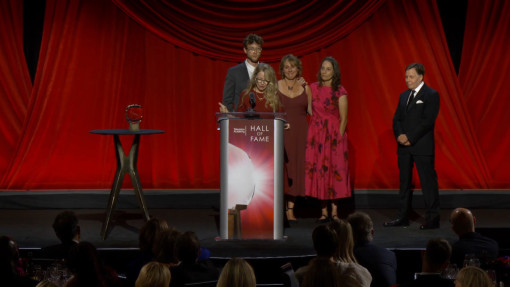For me, with Ms. Tyson, it's all about her eyes. She's an actor who allows you into all of her intimacy, range and passion through her eyes. She doesn't necessarily have to be demonstrative. She can be quiet or verbose, but whatever she's doing, it's all coming across in her eyes. And that's not true for every actor. Some actors are in their bodies, some are in their words, but for her, it's the eyes. You just fall into them.
The first time I spoke with her was when she saw my very first film, called I Will Follow, in 2010. It was playing at one theater in Washington, D.C., and no one was seeing it. I got a phone call out of the blue from a mutual friend who saw it with her, and she said, "Ms. Tyson wants to speak with you." She said the most encouraging, stunning words to me as a young filmmaker. At that moment, it was one of the things I held on to to keep going.
Every day she was on the set of Cherish the Day, it truly felt like we were being visited by royalty. The crew fell all over themselves. If they could've dropped rose petals in front of her feet with every step, they would've. People genuflected when she went to get a bagel. She's remarkable, not just for her body of work but just the way she is with people. Down to the bone, she's a lovely person.
She's found a divine chord. She's such an anomaly and has had so many ups and downs in this industry — some very lean years. We're looking at a trajectory of many decades to see the blossoming of this gorgeous flower in her choices and her art.
She said, "I will do these kinds of things, and I won't do those kinds of things." She's a shining example of success with that kind of selectivity. You can have conviction as a person and a woman of color, and although there may be some tough times, you can get to the end of a beautiful road with that.
Ms. Tyson has a tremendous work ethic, and she's such an activist. To have that kind of focus to only do things that are a non-stereotypical view of black womanhood is awe-inspiring. It's a muscular task, and you need a giant like her who's up for it. She did it, and she's still doing it.
Her influence is monumental and generationally transformative. It looms that large. There's no comparison, to have a black woman be able to occupy that space. After so many years, she's still working at such a highly committed level — she's not phoning anything in. She still wants to talk about character. I can't tell you how important it is for someone like me to see what she makes possible. She didn't have that example to look up to. And we have her to look up to.
She has an artist's heart. When it's nurtured and beating strong, you have to heed the call. You have to stand up. It doesn't go away. She listens to it, and does right by it, and it continues to nourish her. Her work speaks for itself.
In addition to her spectacular career in feature films (she was awarded an honorary Oscar in 2018) and on stage (she won a Tony for The Trip to Bountiful in 2013), Cicely Tyson has had a major impact on television. She became the first African-American actor to play a regular role in a primetime drama series, costarring with George C. Scott on East Side, West Side in 1963-1964. Tyson delivered a tour de force performance in 1974's TV movie The Autobiography of Miss Jane Pittman, portraying the title character from her days as a teenage slave to a 110-year-old civil-rights activist. The role won Tyson two Emmy Awards. More recently, she's earned four Emmy nominations as Viola Davis's mother in ABC's How to Get Away with Murder, and she costars in OWN's upcoming series Cherish the Day, executive produced by Ava DuVernay.
DuVernay, winner of Emmy, BAFTA and Peabody Awards, is an Academy Award nominee whose directorial work includes the historical feature film Selma, the criminal justice documentary 13th and Disney's A Wrinkle in Time. Her Netflix limited series When They See Us recently garnered 16 Emmy nominations.
This tribute originally appeared in the Television Academy Hall of Fame program celebrating Cicely Tyson's induction in 2020.










